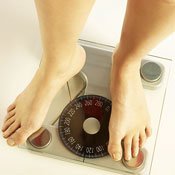My Dad called me "Slim." As a high school senior, I was 5 foot, 5 inches, and 118 pounds. Years passed, and after birthing and breast-feeding two wonderful sons, my once-maidenly body waved goodbye. More years passed, and after a total hysterectomy, I became Rubenesque. At some point, I threw caution to the wind, jumped into sauces, large portions and anything fried, and became fat.
I'm big-boned (yeah, we all say it), and I will never be little again. But what are my reasons for allowing the "fat"' to take over my life? Was I rebelling against my unfeminine childhood nickname? Or was I using food to numb pain, fill emotional voids or avoid intimacy? Is it all or none of the above? Who knows?
What I do know is that my wide, flowing shirts and loose-fitting garments could not hide the wonderfully globe-shaped midriff I'd earned because of my reckless relationship with food.
High liver enzyme counts interrupted the relationship. My conversation with my doctor went something like this:
Me: "I'm frustrated. What do I need to do differently?"
Doctor: "Well, it might help if you had input from a nutritionist."
Me: (laughing) "Unless you float me a loan, I can't afford a nutritionist. What's the next best thing?"
Doctor: "Do you know anything about Weight Watchers? It's a nutritionally sound approach to eating. You might want to check them out."
I began to inquire. A lady that worked with me went to WW at her lunch break once a week. I rode with her to WW for a visit. She advised that I choose the lightest weight garment to wear every week for weigh-ins to avoid factoring in different clothing weights.
On that first visit, I paid my fee and stood in line with lots of other people to step on the scales. I was nervous. The truth didn't lie. I acknowledged the bulk of me and was relieved that only the WW counselor and I saw the truth. She noted my weight in my records.
The WW counselor suggested my initial goal be to lose 10 percent of my body weight. After reaching that goal, I chose my optimum weight goal and achieved that.
WW quickly taught me the importance of record keeping, in terms of weekly weight changes and daily food intake. All foods have a point count per serving. Based on my weight, I was assigned a point intake maximum and minimum per day for losing weight. Short weekly meetings added meal and food prep ideas and motivation. Though I started out confused, I followed the program, got results and began to trust it.
At first, I dreaded the record keeping. I panicked, fearing I would consume the point count allotted to me early in the day and have to starve the rest of the day. Then I realized it was a lifeline: I was beginning a long process of learning to gain control over my life, as it related to food.
A new WW signee relaxed when she found out the program allowed her a glass of white wine every evening. With that, she said, she could go forward.
I could eat any food, just as long as I did so in a way that confined my intake to the day's assigned point level—even hamburgers. A small regular burger on a bun with lettuce, tomato, pickle, mustard, ketchup (no mayo), with a green salad and light dressing instead of fries, added up to approximately eight points out of my 25-28 point allotment for the day. This could work.
Also, the list of zero-point foods was manna. I could pan-roast broccoli, squash, cherry tomatoes and red peppers—all zero points—in a tablespoon of olive oil, serve them on a small mound of whole wheat spaghetti and only consume approximately six points. And I was full.
I began to think differently.
Approximately 30 pounds later, my enzyme counts are normal. A friend said: "Jackie, you've got to get rid of that jacket. It's way too big for you." I tossed the jacket. It was a step toward beginning to re-inhabit my body and love it again.
I learned that a war with food isn't the answer. I learned that I have to consistently be aware and make wise choices about diet and exercise. There's no applause and no living happily ever after. It's a change in my everyday decisions and routines: I must choose between roasted or fried, fresh vegetables or junk food, dancing or chips and TV. This is forever.
Confucius said, "Our greatest glory is not in never falling, but in rising every time we fall." I'm still getting up.
Hints
• Eliminate sweet tea from your diet.
• Stir fruits into low-fat whipped topping for dessert.
• Make friends with nuts—no, not the human kind. Eat a few almonds (e.g., six to eight) between meals to squelch hunger and supply protein.
• Take a good multi-vitamin.
• Drink lots of water.
• Cut portions. Eat a little. Talk a lot. Let full come to you.



Comments
Use the comment form below to begin a discussion about this content.
comments powered by Disqus